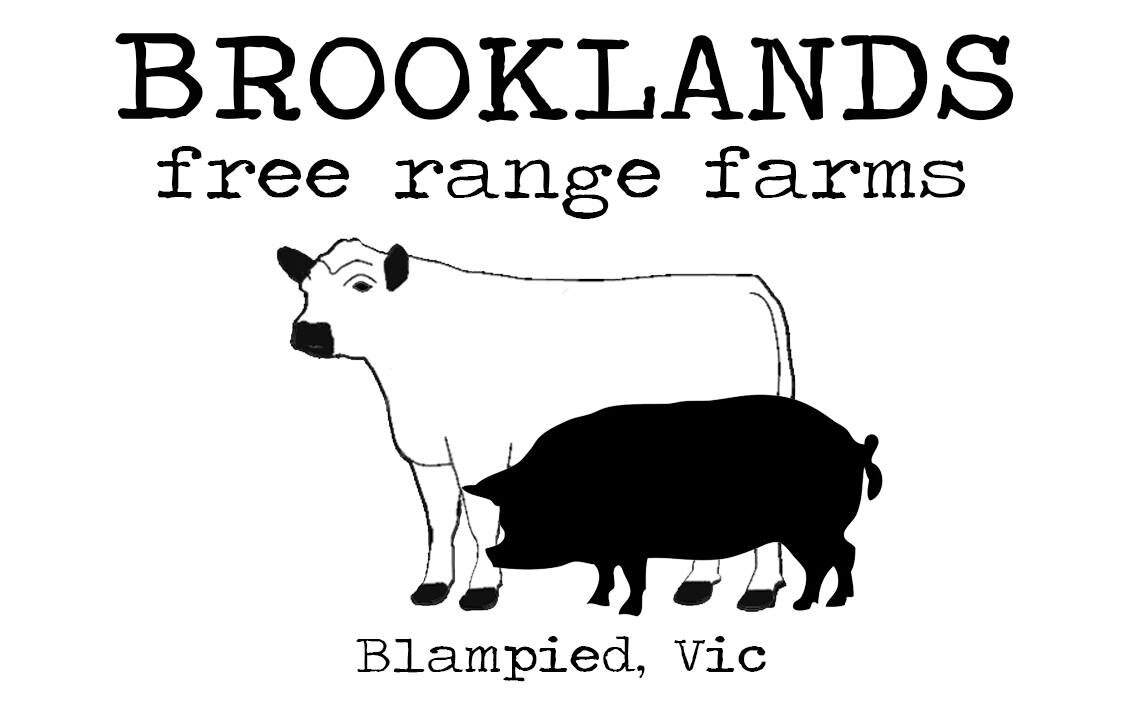Rare Breeds at Brooklands
It may seem counterintuitive to eat a rare farm animal. But that’s what’s needed to ensure their survival. The more people eat rare breed pigs, sheep and cattle, the more demand there is to increase their numbers and so the more that will be bred. At Brooklands Free Range Farm, we raise rare breed Berkshire pigs, British White Cattle and Finn sheep for wool. These are breeds that the modern farming world has left behind in favour of animals that perform well in sheds or feedlots.
British White Cattle
The cattle at Brooklands are British White, a distinctive British beef breed with a long history. Bred for their calm disposition they are ideal for our way of regenerative farming in which the stock are moved frequently from pasture to pasture. With their white coats and black face and ear markings, they are handsome creatures that produce superb beef. This is because they have retained their foraging instinct and will eat a greater variety of plants that provide nutrition and give the beef its distinct flavour and tenderness. In the European tradition, the animals are sent for slaughter between two and three years. They are a great breed, with an extremely quiet nature and combined with the Brooklands regenerative farming methods, their beef is much sought after by food lovers.
Our British White 100% Grass-Fed Beef has been entered twice into the Delicious Magazine Produce Awards in the “From The Paddock Section” taking out the State Award in 2018 & National Gold Medal in 2019.
We have around 25 breeding cows with our stud bull and up to 40 yearlings to 2yo which are all regularly rotated onto fresh chemical-free pasture.
They are considered a rare breed and are on the Rare Breed trust list in Australia and on the watch list of the Rare Breed Survival Trust in the UK. We are members of the British White Cattle Society of Australia and very happy to answer any inquiries about the breed.
Berkshire Pigs
The pigs at Brooklands Farm are Berkshire. One of the oldest pig breeds in England, they were bred to forage in the forests of Berkshire. They are a big, black pig with pointed ears and white feet. They are an active pig with an instinct to continually forage and dig, grazing and foraging with plenty of downtime in the shady wallows on hot days or snug in their straw huts in the cold. They are all born free in moveable huts which provide shelter when they are not freely grazing the multi-species forage pastures.
We move the pigs from paddock to paddock regularly. After they have eaten out one pasture, we then drill seed a salad bar multi-species grazing mix of up to 16 varieties for their next pasture graze.
In addition to their foraging pastures, they are fed twice daily on a mix of Whey from Goldfields Farmhouse Cheese, Spent brewers grain from local breweries, waste fresh fruit and vegetables which we collect three times a week from local grocers and a locally farmed custom grain mix which tops up their protein, carbohydrate & lying requirements. This active life and healthy diet results in a good balance of deep pink muscle interlaced with intramuscular fat with a good, but not overwhelming, exterior layer of fat. What many people notice is not just the juiciness of the pork but the subtle mineral flavour, attributed to the volcanic nature of the soil.
In autumn we select around 10, which for that month are fed acorns and quince from a local farm producing the sweetest of pork you have ever tasted.
We have a closed herd of 16 Sows and three boars with up to 100 growers, all born and raised on our farm outdoors.
Finn Sheep
Here at Brooklands, we are honoured to have a flock of some of the most endangered sheep on the planet. Finn Sheep are an old wool breed known for their fine wool and their ability to drop twin, triplets and quadruplets. They are also very good mothers. They are not a meat breed and at Brooklands are shorn annually and the wool sold to hand spinning enthusiasts.
Finns have a clean face, breech (no wool around belly, bottom & legs) with tiny tails. Short, clean tails mean that we do not have to dock their tails and clean breech and legs mean further reducing the risk of flystrike. Another advantage of Finns is their multiple births. Not only twins or triplets, but also quadruplet and quintuplets. In fact, our current Rams mother is one of 6 lambs!
We have a small flock of Finns to help preserve the breed and also have a job on this farm as they are extremely handy moving around our property cleaning up laneways and shelterbelts for fire preparation. We lamb in Spring, shearing just before lambing. We sell their wool direct to hand spinners per fleece and have pure lamb ewes and rams for sale.




